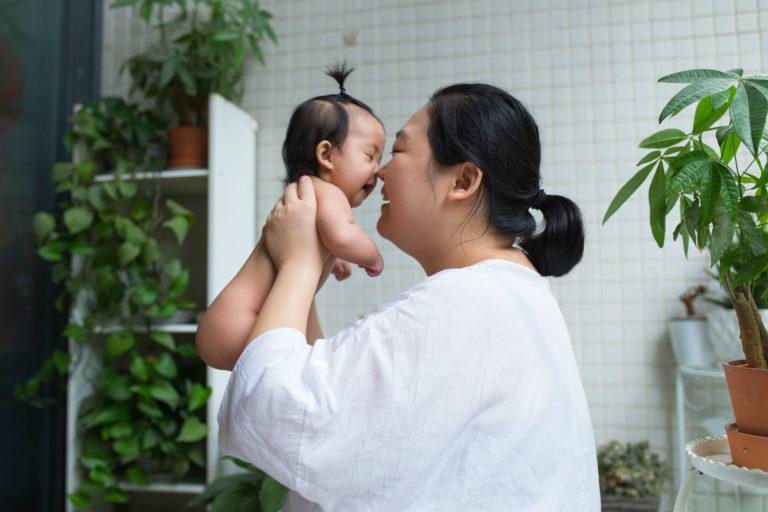So, you’ve survived 9 months of pregnancy, successfully brought your tiny human into the world, and have weathered the 6-8 weeks of recovery like the superhero that you truly are. Your doctor has given you the good to go, so it is finally time to return to a normal sex life! Right?
Well, as it turns out, not always. Postpartum dyspareunia, or painful sex after having a baby, is a very common condition. It is estimated that up to 60% of women experience painful sex at 6-7 weeks postpartum and that 17% of women continue to have pain 6 months postpartum and beyond. Additionally, low libido due to altered hormones and fatigue is common in the postpartum period.
Postpartum dyspareunia can be associated with a number of factors, including postpartum infection, tearing or episiotomy during birth, improperly healed stitches, pelvic organ prolapse, pelvic floor dysfunction, and breastfeeding. Additionally, poor quality sleep and high stress levels are associated with painful sex postpartum.
From a Chinese medicine perspective, there are several factors that contribute to postpartum dyspareunia. First, if injuries such as tearing, episiotomy, or surgery occurred during birth, pain may be due to scar tissue and “stuck” energy where the injuries occurred.
Second, the act of carrying a pregnancy and giving birth is tremendously taxing to the body. For 9 months, your body was responsible for growing and feeding another human being, followed by the physical demands of delivering a child. Mothers lose blood and qi while giving birth, and enter the postpartum period in a relatively fragile state. For mothers who breastfeed, blood and qi are required to produce breast milk, further depleting the body’s reserves. This state of depletion affects the ability of the body to heal areas injured during delivery and leads to a lack of nourishment and lubrication in the genitals.
If you’ve been suffering from painful sex after giving birth, there are several ways that you can help to get your mojo back

Water Based Lubricant
The postpartum drop in hormones (which continues while breastfeeding) can thin and dry out vaginal tissues, causing pain and discomfort due to friction. A good quality water-based lubricant can increase comfort during sex.
Prioritize Sleep
While it may seem almost impossible with a new baby in the house, try to prioritize sleep. Don’t be afraid to ask for or hire help – see if a friend or family member can take care of your baby for a few hours so you can nap, ask your partner to give bottles overnight every once in a while so you can rest, or even look into hiring a night nurse or doula for a short time so that you can get some quality sleep.
Check in with your OB/GYN
Let your OB/GYN know what is going on so that they can address any issues. If your stitches have not healed correctly, you may have developed granulation tissue or excessive scar tissue. Your doctor may wish to remove some of this excess tissue to alleviate discomfort. Your OB/GYN can also evaluate you for any infection that might need to be treated with a course of antibiotics or prescribe medication to help alleviate vaginal dryness associated with breastfeeding.
Acupuncture and Chinese herbal medicine
Acupuncture and herbs are great at helping the body to recover during the postpartum period. Acupuncture is fantastic at getting stuck energy moving and reducing pain. Acupuncture can also address issues contributing to postpartum dyspareunia such as poor quality sleep and high stress levels. Herbs are very helpful in replenishing qi and blood lost during delivery. Be sure to advise your acupuncturist if you are nursing so they can recommend herbs that are safe for breastfeeding.
Physical Therapy
A women’s health or pelvic floor physical therapist (PFPT) has specialized training in female reproductive anatomy. If your dyspareunia is due to a pelvic floor issue such as pelvic organ prolapse, hypertonic (tight) pelvic floor, or scar tissue, sessions with a PFPT can be extremely helpful in relieving symptoms. Pelvic floor physical therapy can also address a number of other postpartum issues, including diastasis recti, postural imbalance, pelvic organ prolapse symptoms, and urinary incontinence.
Talk to Someone
Reach out to a therapist who specializes in postpartum issues. Becoming a parent is life-changing, and it can be difficult to adjust to the demands of your new life. It’s normal to experience lower sex drive due to the stress of a new baby, having less time to connect with your partner, and/or feeling insecure about your postpartum body. Postpartum mood disorders can further complicate these stressors. Make time to take care of your mental health after baby – getting back your sex drive is just one of the many benefits!
If you would like to learn more, please join us on February 12th at 6:30 pm at Yinova Brooklyn Heights for a panel discussion about having sex, reconnecting with yourself & reconnecting with your partner – postpartum.






